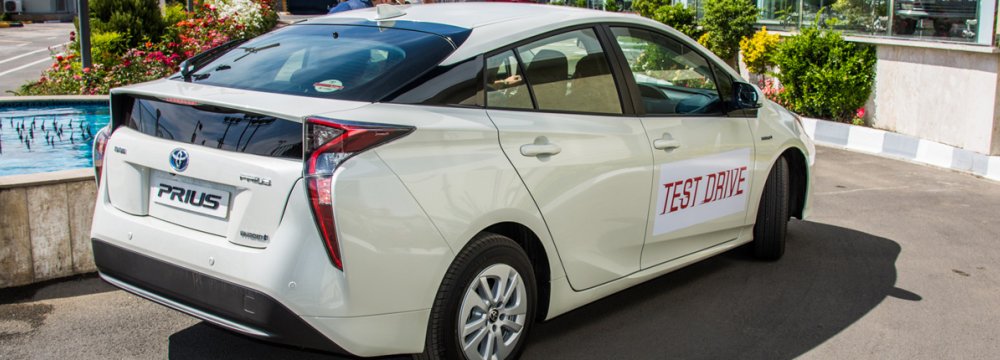
Tariff Cuts for Hybrid Cars

According to the numbers released by the Islamic Republic of Iran Customs Administration, the tariff rate for hybrid vehicles will depend on the capacity of vehicles’ gasoline-burning engines.
For hybrids with engine capacity of less than 1,500 cc and below, the import tariffs has dropped to 5% and for cars with the engine size between 1,500 cc and 2,500 cc, the customs duty stands at 25%.
The administration suspended auto import rules during the summer of 2017. The hiatus lasted until January when the amended version of auto import rules was introduced, according to which, depending on engine capacity, import tariffs on gasoline-fueled vehicles rose by 15-40%.
Currently, import tariffs on fusil-fuel-powered cars are between 55-95%—among the highest in the world—and vehicles costing more than $40,000 are banned from entry.
The directive also pushed up tariff rates for hybrid vehicles from 5% to 25-65%, depending on engine capacity.
Twists and Turns
The measure faced stiff opposition from the public, the media and environmentalists alike, accusing the government of abandoning its oft-mentioned green policy to collect revenues.
To justify the move some officials have pointed to an exploitation of the law by some importers who would bring hybrids which were slightly more fuel efficient and less pollutant compared to gasoline-burning cars.
The controversy culminated in a lawsuit filed with the Court of Administrative Justice.
The court issued an order temporarily suspending the government’s amendment. While law experts were of the opinion that the court’s ruling effectively returns tariff rates to previous levels, the Ministry of Industries confirmed that the court does hold jurisdiction over the issue, but denied ever receiving the order.
During the ups and downs of bureaucracy and the government stalling to enforce the court’s decision, the price of imported cars went through the roof and the public and car sellers opted for the usual wait-and-see approach.
Days before Norouz (Iranian New Year holiday season from March 21 to April 2) , the parliamentary Article 90 Commission held a meeting with government and customs officials and made it clear that the court order is binding and must be implemented in its entirety.
The tariff rates have not fully bounced back to earlier levels, but it is still considered a win for the environment.
A few hybrid models are currently imported into the country, including Toyota Prius priced at 2.1 billion rials ($50,000), Hyundai Sonata LF priced at 2.48 billion rials ($59,000) and Kia Optima JF at 2.6 billion rials ($ 63,500).


Gold price edges up as market awaits Fed minutes, Powell speech

Glencore trader who led ill-fated battery recycling push to exit

Emirates Global Aluminium unit to exit Guinea after mine seized

UBS lifts 2026 gold forecasts on US macro risks

Iron ore price dips on China blast furnace cuts, US trade restrictions

Roshel, Swebor partner to produce ballistic-grade steel in Canada

EverMetal launches US-based critical metals recycling platform

US hikes steel, aluminum tariffs on imported wind turbines, cranes, railcars

Afghanistan says China seeks its participation in Belt and Road Initiative

First Quantum drops plan to sell stakes in Zambia copper mines

Ivanhoe advances Kamoa dewatering plan, plans forecasts

Texas factory gives Chinese copper firm an edge in tariff war

Pan American locks in $2.1B takeover of MAG Silver

Iron ore prices hit one-week high after fatal incident halts Rio Tinto’s Simandou project

US adds copper, potash, silicon in critical minerals list shake-up

Barrick’s Reko Diq in line for $410M ADB backing

Gold price gains 1% as Powell gives dovish signal

Electra converts debt, launches $30M raise to jumpstart stalled cobalt refinery

Gold boom drives rising costs for Aussie producers

First Quantum drops plan to sell stakes in Zambia copper mines

Ivanhoe advances Kamoa dewatering plan, plans forecasts

Texas factory gives Chinese copper firm an edge in tariff war

Pan American locks in $2.1B takeover of MAG Silver

Iron ore prices hit one-week high after fatal incident halts Rio Tinto’s Simandou project

US adds copper, potash, silicon in critical minerals list shake-up

Barrick’s Reko Diq in line for $410M ADB backing

Gold price gains 1% as Powell gives dovish signal

Electra converts debt, launches $30M raise to jumpstart stalled cobalt refinery
















